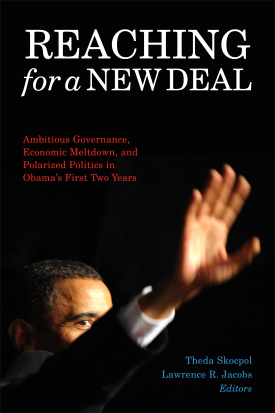
Reaching for a New Deal
About This Book
During his winning presidential campaign, Barack Obama promised to counter rising economic inequality and revitalize America’s middle-class through a series of wide-ranging reforms. His transformational agenda sought to ensure affordable healthcare; reform the nation’s schools and make college more affordable; promote clean and renewable energy; reform labor laws and immigration; and redistribute the tax burden from the middle class to wealthier citizens. The Wall Street crisis and economic downturn that erupted as Obama took office also put U.S. financial regulation on the agenda. By the middle of President Obama’s first term in office, he had succeeded in advancing major reforms by legislative and administrative means. But a sluggish economic recovery from the deep recession of 2009, accompanied by polarized politics and governmental deadlock in Washington, DC, have raised questions about how far Obama’s promised transformations can go. Reaching for a New Deal analyzes both the ambitious domestic policy of Obama’s first two years and the consequent political backlash—up to and including the 2010 midterm elections.
Reaching for a New Deal opens by assessing how the Obama administration overcame intense partisan struggles to achieve legislative victories in three areas—health care reform, federal higher education loans and grants, and financial regulation. Lawrence Jacobs and Theda Skocpol examine the landmark health care bill, signed into law in spring 2010, which extended affordable health benefits to millions of uninsured Americans after nearly 100 years of failed legislative attempts to do so. Suzanne Mettler explains how Obama succeeded in reorienting higher education policy by shifting loan administration from lenders to the federal government and extending generous tax tuition credits. Reaching for a New Deal also examines the domains in which Obama has used administrative action to further reforms in schools and labor law. The book concludes with examinations of three areas—energy, immigration, and taxes—where Obama’s efforts at legislative compromises made little headway.
Reaching for a New Deal combines probing analyses of Obama’s domestic policy achievements with a big picture look at his change-oriented presidency. The book uses struggles over policy changes as a window into the larger dynamics of American politics and situates the current political era in relation to earlier pivotal junctures in U.S. government and public policy. It offers invaluable lessons about unfolding political transformations in the United States.
THEDA SKOCPOL is Victor S. Thomas Professor of Government and Sociology at Harvard University.
LAWRENCE R. JACOBS is the Walter F. and Joan Mondale Chair for Political Studies and Director of the Center for the Study of Politics and Governance in the Hubert H. Humphrey Institute and Department of Political Science at the University of Minnesota.
CONTRIBUTORS: Andrea Louise Campbell, Daniel Carpenter, Judith A. Layzer, Lorraine M. McDonnell, Suzanne Mettler, John D. Skrentny, Dorian T. Warren.
